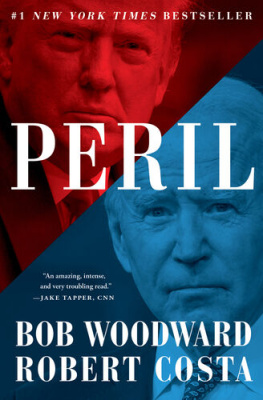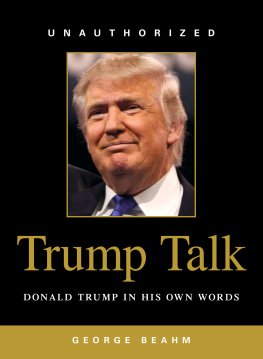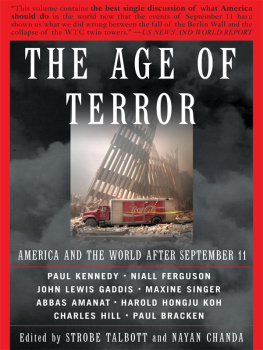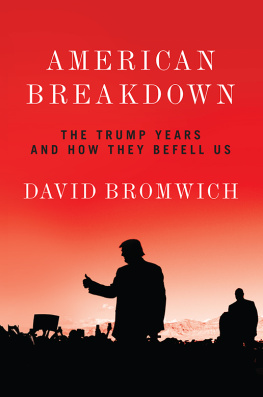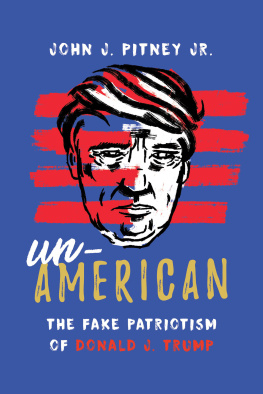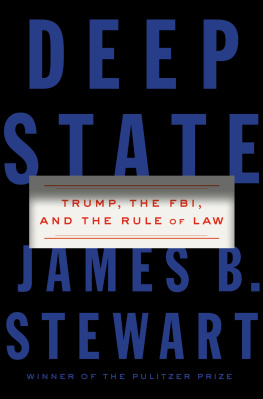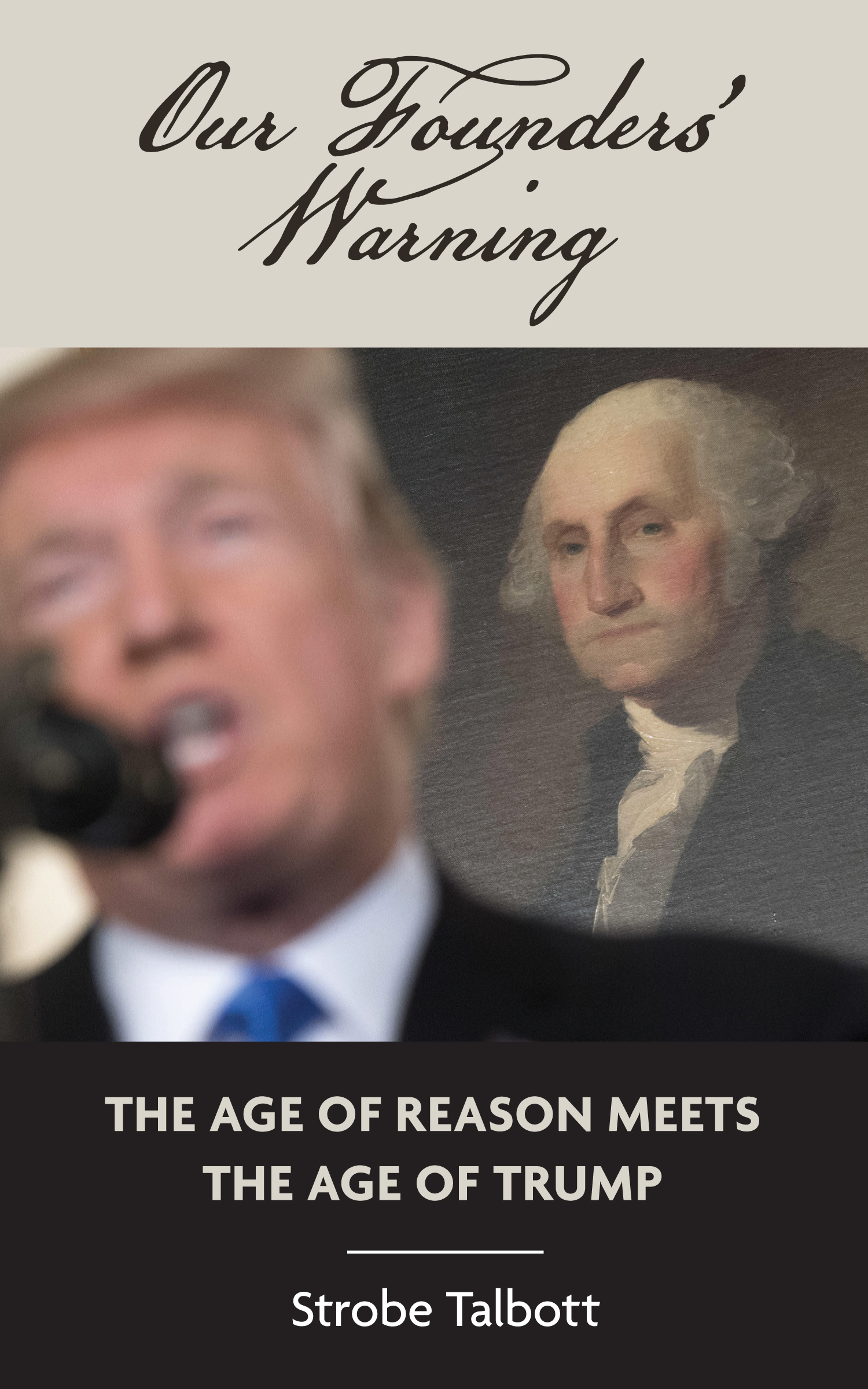Contents
Guide
Pagebreaks of the print version
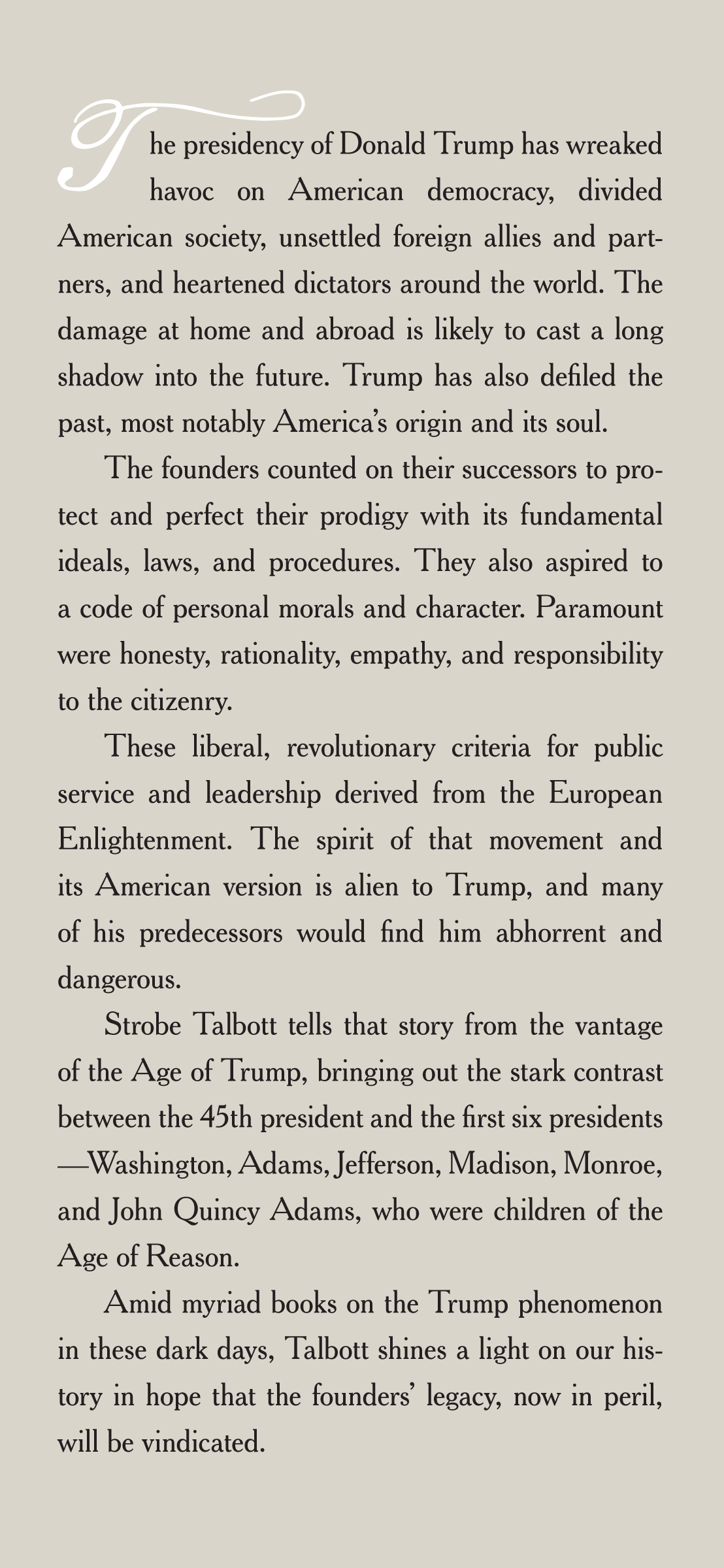
BOOKS BY STROBE TALBOTT
Khrushchev Remembers
(translator and editor)
Khrushchev Remembers: The Last Testament
(translator and editor)
Endgame: The Inside Story of SALT II
The Russians and Reagan
Deadly Gambits: The Reagan Administration and the Stalemate in Nuclear Arms Control
Reagan and Gorbachev
(with Michael Mandelbaum)
The Master of the Game: Paul Nitze and the Nuclear Peace
At the Highest Levels: The Inside Story of the End of the Cold War
(with Michael R. Beschloss)
The Russian Hand: A Memoir of Presidential Diplomacy
Engaging India: Diplomacy, Democracy, and the Bomb
The Great Experiment: The Story of Ancient Empires, Modern States, and the Quest for a Global Nation
Fast Forward: Ethics and Politics in the Age of Global Warming
(with William Antholis)
OUR FOUNDERS WARNING

The Age of Reason Meets the Age of Trump
STROBE TALBOTT
BROOKINGS INSTITUTION PRESS
Washington, D.C.
Copyright 2020
THE BROOKINGS INSTITUTION
1775 Massachusetts Avenue, N.W.
Washington, D.C. 20036
www.brookings.edu
All rights reserved. No part of this publication may be reproduced or transmitted in any form or by any means without permission in writing from the Brookings Institution Press.
The Brookings Institution is a private nonprofit organization devoted to research, education, and publication on important issues of domestic and foreign policy. Its principal purpose is to bring the highest quality independent research and analysis to bear on current and emerging policy problems. Interpretations or conclusions in Brookings publications should be understood to be solely those of the authors.
Library of Congress Control Number: 2020938100
ISBN 9780815738237 (hc)
ISBN 9780815738244 (ebook)
9 8 7 6 5 4 3 2 1
Typeset in Cheltenham
Composition by Elliott Beard
To Barbara and our families
O! Ye unborn Inhabitants of America! Should this Page escape its destined Conflagration at the Years End, and these Alphabetical Letters remain legible, when your Eyes behold the Sun after he has rolled the Seasons round for two or three centuries more, you will know that in Anno Domini 1758, we dreamed of your times.
Nathaniel Ames, publisher of the first annual American almanac

Posterity! You will never know how much it cost the present generation to preserve your freedom! I hope you will make a good use of it. If you do not, I shall repent in Heaven that I ever took half the pains to preserve it.
John Adams, in a letter to Abigail, April 26, 1777

However [political parties] may now and then answer popular ends, they are likely in the course of time and things, to become potent engines, by which cunning, ambitious, and unprincipled men will be enabled to subvert the power of the people and to usurp for themselves the reins of government, destroying afterwards the very engines which have lifted them to unjust dominion.
George Washingtons Farewell Address
Contents
Preface
During the first months of the coronavirus pandemic, while I was finishing this book, my wife and I were self-quarantined in a hamlet far out on Long Island, New York. I would take a noon break to tune into Governor Andrew Cuomos daily update on the pandemic that was devastating the state more than any other. Following his remarks and before taking questions from the press, he would recite a variation of a mantra: New Yorkers are tough, smart, united, disciplined, and loving. The refrain was not just a grace note; his congratulations were a reminder to his fellow citizens of their responsibility for a working democracy.
Toward the end of each day, I would put away the manuscript and watch Donald Trumps briefing from the White House. His objective, as always, was to congratulate himself. His toughness is that of a bully. He made sure that the world thought he was a genius who could outsmart the experts. Divide and conquer has been his grand strategy. Discipline meant absolute fealty to his caprices. His self-love is so cavernous that there is little space for anyone or anything else. He spews hatred at those who oppose him or get in the way of his personal vanities and goals.
These deformations were also on gruesome display when a Minneapolis police officer choked to death George Floyd, a Black man, in broad daylight. Trump urged an indiscriminate crackdown against mostly peaceful protests and threatened to put the country under martial law.
There was an eerie overlap between a global pestilence and another case of lethal police brutality against a Black person. As American fatalities rose beyond a hundred thousand, many of the victims died because, like George Floyd, they couldnt breathe. His last cries echoed the anguish of his race.

In Trumps 2017 inaugural address, he accused his precursors of this American carnage, and he vowed he would end it right here and now, whatever it was. That gratuitous slur will haunt him now that he has stoked two real tragedies.
Before the virus sneaked into coastal America and a chance recording of George Floyds death went viral from the heartland to the world, Trump had already grievously damaged our polity, society, and nations reputation in the world.
The body politic of our country has been panting through four years of Trumps reign. Multiple sectors in the U.S. electorate have a vital stake in defeating Trump. They will be looking to the future, but they will also be surrogates for the founders of the American republic. Those long-dead men did their best to ensure a set of noble principles and durable institutions for their successors to steward.
They were worried. Their letters and speeches were often flares shot over the horizon in the hope that posterity would heed their warnings.
In these pages, I have tried to refresh the memory of what our founders did, as well as why and how they did it. I hope, within that historical context, Trumpism can be seen more clearly as a concerted effort to undo the foundation of our government.

I am a student of history, not a historian. My first and longest profession was journalism. The term makes explicit that the news is new, ripe for the day. After more than two decades at Time magazine, I was recruited into government in the 1990s, then think-tankery. Both pursuits dealt with the here-and-now. My previous experience as a reporter helped me uncover the nub of a coherent, accurate story and explain why it mattered.
There is another advantage for a newshound retelling the story of Americas origin: the protagonists were ahead of their time. They were not just waiting to see what the future would bringthey were planning for it, building it.
Reading primary sources has often felt as though I was interviewing the founders. Their personalities are still vivid, their assertions articulate, their debates vigorous.


